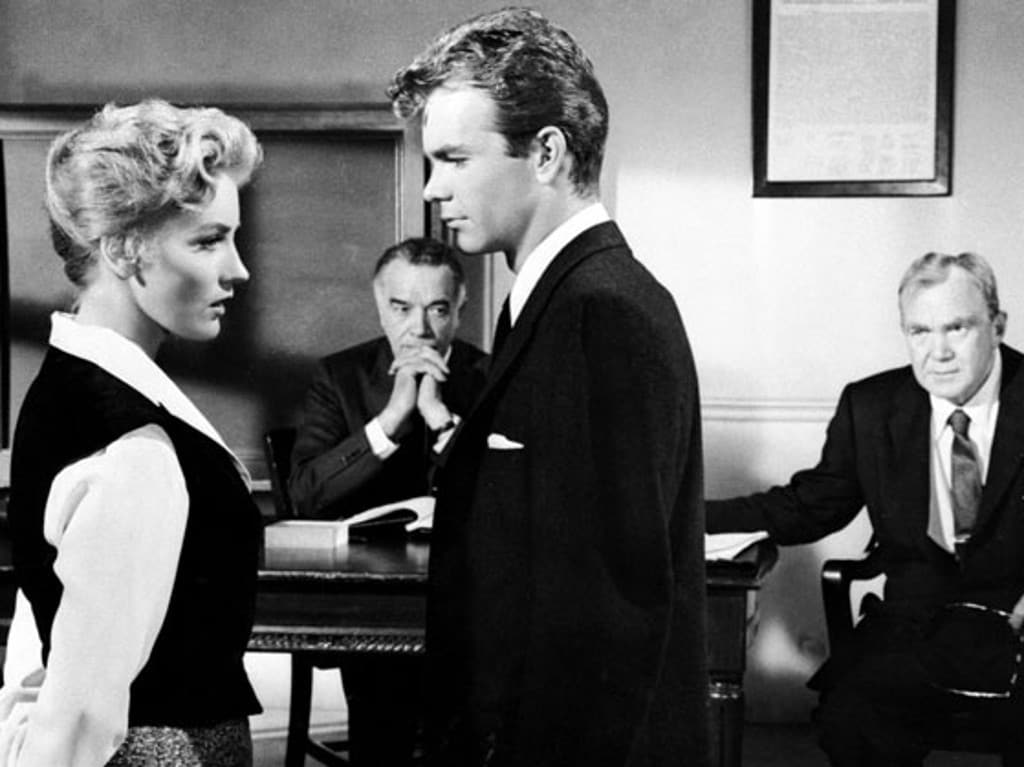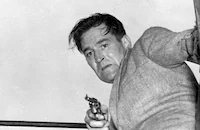Handle with Care

Brief Synopsis
Cast & Crew
David Friedkin
Dean Jones
Joan O'brien
Thomas Mitchell
John Smith
Walter Abel
Film Details
Technical Specs

Synopsis
In the small town of Haverton, at the local law college, Professor Roger Bowdin announces the annual "mock trial" final senior project before graduation. Upon being appointed the "district attorney," the class's top student, Zachary Davis, scoffs at the traditional exercise of participating in a grand jury trial investigation of a fictitious town. Insisting that since he and his fellow students are about to become lawyers in the real world, their final project should be as realistic as possible, Zach demands that they investigate the city of Haverton itself. Although unprecedented, Bowdin agrees to the request. Giving the students one week to prepare, Bowdin then visits affable Mayor Dick Williston, who approves of the project and agrees to participate. Meanwhile, Zach's girl friend and fellow law student, Mary Judson, wonders about Zach's apparent determination to dig up "dirt" on the town. When Mary suggests to Zach that he has never gotten over the conviction and imprisonment of his father, a corrupt city official in another town, Zach angrily agrees and maintains that every place has something to hide. Over the next week, Zach, Mary and the other students examine records at City Hall and throughout town. Zach inspects the town's tax records, scrutinizing books nearly thirty years old. At the students' first meeting, Zach's house mate, Bill Reeves, hesitantly reveals that he has discovered that while Mary's father was the head of the water department, rates went up, then dropped before he left office. Mary is dismayed to have learned that the town's poorest neighborhood has no park for its children. Another student relates that during Bowdin's term as city attorney more cases were settled out of court than tried. The students are uneasy about prying into Haverton's past, but Zach derides them for fearing the truth. When Ray Crowder relates that his investigation has yielded that the banks are charging the city higher interest rates than anywhere nearby, Zach expresses glee. Disturbed by Zach's over zealousness, Bill assures Zach that the students intend to take the investigation seriously, but that they cannot be pleased with any wrongdoing they may unearth. When Bill then implies that Zach's enthusiasm is connected with guilt over his father, Zach strikes him. Ashamed of his loss of temper, Zach then offers to halt the investigation, but Mary insists they continue. On the day of the mock grand jury trial, the students report to Zach that they have learned that a major pipeline was built for the town during Mr. Judson's tenure as head of the water department, which explains the rate hike. Undeterred, Zach has the trial that will examine the various allegations commence, with Bowdin as judge, Mary and Ray as Zach's assistants, Bill as the jury foreman and the remaining students as jury members. As the first witness, Mayor Williston responds to questioning from Mary and Ray, providing clear explanations for the lack of public parks and high interest rates. Bowdin is then summoned and explains that many cases were settled during his term as city attorney to keep court costs down. Zach then asks Williston to return to the witness chair and asks him about his five year tenure as tax collector beginning in 1932. Zach asks Williston to explain the procedure of collecting taxes from the townspeople and depositing the money at the bank. When Zach asks if the tax collector should be charged with malfeasance if the receipts and bank deposit records do not match, Williston refuses to answer and calls a halt to the questioning. Later, in private, Bowdin apologizes to Williston for Zach's brashness. In the classroom, Bill demands to know what Zach has uncovered, but he refuses to say, insisting instead that a grand jury cannot be legally dismissed until all the information has been heard. Reluctantly, the other students agree and present Bowdin and Williston with a request to continue. Williston agrees, but asks for a week to refresh his memory of the period. During the following week, word of the trial slips out across town and the townspeople are angered by Zach's attack on the mayor. Zach is fired from his job at a soda shop and asked to move by his landlady. The newspaper editor summons Zach and accuses him of muckraking with no basis in fact. Farmer Al Lees confronts Zach in the street to demand that he withdraw his veiled accusation of the mayor. Zach remains defiant, but is unsettled when Mary reveals her hopes that should they marry, they will live in Haverton amongst her family and friends. On the day of the grand jury trial's resumption, several townspeople attend. Williston announces his intention to read a prepared statement, but Zach immediately interjects, insisting that he wants specific information not a speech. When Williston scolds Zach for his insolence, Zach accuses Williston of cheating Haverton out of a quarter of a million dollars during 1932 and 1933. Williston tells Zach that he cannot prove the allegation and again asks to read his statement. Zach refuses and forces Williston to concede that the tax receipts and bank deposits for those years do not tally. Williston insists that audits of his entire term balanced, but Zach repeatedly demands to know what became of the missing money. To Zach's annoyance, Mary intervenes to ask Williston about the figures from the remaining years in his term and establishes that the bank deposits for that time make up for the missing money from the earlier years. Zach nevertheless continues to pressure Williston to confess what was done with the money. Bowdin then insists on showing a newsreel of Haverton from the period in question. The film shows the devastation of several years of drought and economic depression upon Haverton. Al then explains that the federal government was repossessing farms, but that their county mortgage company would not foreclose if residents could supply proof of having paid their property taxes. Al admits that he and most of Haverton's farmers had no money at that time, but Williston provided them with tax receipts in order to save their farms. As the effects of the drought waned and federal aid programs were implemented, farmers were again able to earn money and repay their taxes. With this revelation, Bowdin orders the trial adjourned. The mayor then tells Zach that he would willingly answer questions of a formal grand jury to clear the records, but, humbled by the trial experience, Zach flees the classroom. Williston tells Mary to go after Zach, as she and the town need him.

Director
David Friedkin
Cast

Dean Jones
Joan O'brien

Thomas Mitchell
John Smith

Walter Abel
Burt Douglas
Anne Seymour

Royal Dano

Ted De Corsia
Peter Miller
Don Burnett
Emerson Treacy
Nora Marlowe
Owen Mcgiveney
K. L. Smith
Carol Brewster
Ken Patterson
Gregory Loren
Nicholas Clooney
Ron Barbanell
Phyllis Douglas
Helen Dee
Joyce Mccluskey
Crew
Laurence Barbier
Sid Bowen
Alexander Courage
Norwood Fenton
Morton Fine
Morton Fine
David Friedkin
Henry Grace
Edith Grafton
Samuel Grafton
Paul Groesse
Sydney Guilaroff
William A. Horning
Molly Kent
Arthur Krams
Ben Lewis
Lambert Marks
Harold J. Marzorati
Tom Mccoig
Dr. Wesley C. Miller
Violet Noyer
George Rhein
Chris Seiter
William Tuttle

Film Details
Technical Specs

Quotes
Trivia
Notes
The working title of the film was Mock Trial. According to a February 1959 Daily Variety news item, exhibitor Robert L. Lippert, Sr. revived the film after its brief first run as lower half of a double bill. Lippert was impressed with the film's success in England.

Miscellaneous Notes
Released in United States Spring April 1958
Dean Jones' first starring role
Released in United States Spring April 1958












